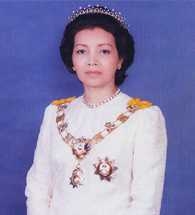Ahead of Johor sultanah’s case, syariah lawyers put in a spot
By V. Anbalagan, Assistant News Editor, The Malaysian Insider
The former sultanah of Johor may have to represent herself when her case to set aside an order that her late husband Sultan Iskandar Sultan Ismail had divorced her comes up at the Johor Syariah High Court on January 20.
The reason? The Johor Syariah Judicial Department announced that no syariah lawyer can appear in court from January 20 onwards until he or she produces a certificate of practice.
This announcement, which is unprecedented, came in a letter dated January 5 which was addressed to the president of the Johor Syariah Lawyers’ Association.
The letter, seen by The Malaysian Insider, was signed by the chief registrar of the Johor Syariah Judicial Department Lokman Hakim Tuan Kamaludin.
The case of the former sultanah, Tuanku Zanariah Tunku Ahmad (pic), who was also a former Raja Permaisuri Agong, began on January 1 when she filed an application to set aside a court order dated September 30, 2010.
The order stated that the late sultan had divorced Tuanku Zanariah, by “talak tiga” and, therefore, the revocation (resumption of conjugal relationship) of the divorce made a week later, was invalid.
The announcement by the Johor Syariah Judicial Department has shocked syariah lawyers not only in Johor but other states as well.
Sources told The Malaysian Insider the decision meant that syariah lawyers could not attend court, even for case management.
A source said in normal circumstances, syariah lawyers would be allowed to practise without their licence as long as they had paid renewal fees to the Johor Religious Department at the end of the previous year.
The licence to practise would then be issued at some point in January or later.
A syariah lawyer who has been in practice for 30 years, and who spoke on the condition of anonymity, said this was the first time the Johor Religious Department had issued a letter barring them from practising without the official certificate.
“This is going to cripple the operation of the syariah courts in the state,” the lawyer told The Malaysian Insider.
“Even syariah lawyers outside Johor will not be able to practise in the state following this move.
“This has taken many lawyers by surprise as it could affect their livelihood and that of their staff if counsel does not attend court indefinitely. Why should others suffer due to the inefficiency of the department?” the source asked.
With the exception of the Federal Territories, Islam and religious courts come under the authority of the sultans or Malay rulers who are head of the religion.
Most syariah courts deal in divorce, custody of children, alimony, property claims and estate matters.
In her affidavit in support of the application, Tuanku Zanariah alleged that the state administration, especially the religious authorities, was used in an attempt to defame her and Sultan Iskandar.
Tuanku Zanariah said the late ruler did not make any application to verify the alleged divorce, adding that she and the late sultan were both living together as lawful husband and wife in peace and harmony until Sultan Iskandar died on January 22, 2010.


